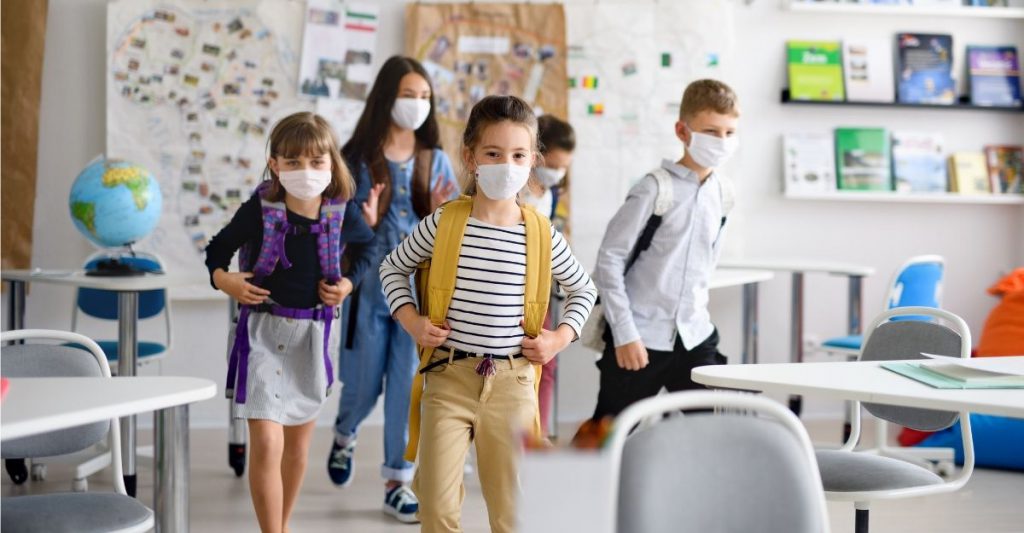With COVID-19 already making its way throughout the world, the attempt of re-opening schools and bringing staff and students back to the campus is without significant risk, but something that needs to be carefully calibrated with CDC guidelines and school safety protocols. Though the vaccination process to bring down the active COVID-19 cases is in full swing, the new variants–Delta and Delta Plus of COVID-19– have increased the risk of the spread yet again.
Schools not only provide education and social support to students, but also serves as a place where a child’s safety and wellbeing is ensured— a key consideration for working parents. But things have changed during the COVID-19 pandemic, with most parents left worried about the health and safety of their children at school.
Ever since the pandemic hit countries and forced students to sit at home in order to contain the coronavirus, millions of students all over the United States adopted digital solutions to continue their classes. When the first COVID-19 case emerged in early January last year in the U.S., schools, colleges and other educational institutes were asked to shut down and students urged to join online learning classes to avoid disruption of education.
Thanks to technological advancements, which played a significant role in facilitating the continuity of education for millions of students and schools can maintain the momentum. During the virtual learning era, a wide range of applications and smart technical solutions have emerged to support the students and school staff.
At this point, taking parents, students, and staff into confidence is one of the biggest challenges that school’ administrators are facing these days, and the only solution is to spread awareness about the safety measures implemented at the school level. This will help in driving out their anxiety or fears regarding the school’s environment and potential risks.
How to Re-open Schools by Communicating about Safety Measures?
The major concern now is whether re-opening the schools will lead to a resurgence of infection among the students and the staff. Many studies and health experts have claimed that children are at higher risk due to Delta and Delta Plus variants, which is more transmissible and contagious. Experts believe that children under the age of 12 and those unvaccinated are more vulnerable to the new infectious variants.
Amid fears of another COVID-19 wave, schools across the U.S. are reopening and students are slowly returning to classrooms after months-long closure.
Besides following safety protocols inside the campus, school administrators need to boost the confidence of students, parents, and staff by informing and reassuring them about the safety measures in place on the campus. In this digital era, they can rely on digital assistants as they not only disseminate crucial information about safety measures but also reduce the excess workload of staff maintaining students’ health records and keeping track of their issues while ensuring they are addressed.
Three Things To Improve Confidence Among Students
1. Focus on psychological well-being to re-open schools
Parents have the right to ask administrators questions on how the schools will ensure the mental well-being of students and what their plans are to tackle any mental health disorder. Stigma means that a student with mental health issues may be discriminated against or viewed negatively because of their condition.
Schools must provide social skills for children and establish programs to support the mental health of students, who are coming back to classrooms after suffering from any trauma caused by the COVID-19 pandemic.
To improve the psychological well-being of the students, schools must hire psychologists, students’ mental health experts and special teachers for vulnerable children.
School administrations can also leverage new-age technology that provides a wide range of solutions through smartphones and tablets. It is now possible to use technology to provide remote diagnosis and treatment anytime and anywhere. Students, especially those who ignored mental health treatment in the past, can get diagnosis and treatment instantly without involving anyone.
2. Stay connected with students to re-open schools
Even though schools have resumed and numbers of COVID-19 cases in the country have dropped significantly compared to last year, many parents are still sticking with virtual learning. According to reports, 19% of White parents currently prefer fully remote instruction when compared to 43% of Black and 42% of Hispanic families.
School administrations must stay in contact with students and reassure the parents that their schools have enough safety measures to protect children from any threats. It is the responsibility of the schools to keep parents informed about the steps are being taken to help ensure the emotional and physical safety of students.
3. Create Community Partnership to fully re-open schools
To build confidence among parents, especially those not willing to send their children back to the classroom physically, a mutual understanding between schools administration and community organizations can play a vital role. With the help of community organizations, administrators can share data and pieces of information about their schools’ safety and security measures. This collective responsibility can help in building trust among parents about the safety of their children in the classrooms.
What @School Can Do for re-open school?
With an understanding of the evolving COVID-19 situation and the pressing need for technological solutions to mitigate risks as schools reopen, Knowledge Bridge Consulting Inc, a leader in providing integrated information technology, products, and services, has developed a digital assistant, @School. The productivity tool has been developed and designed to improve safety at school with features including COVID-19testing, symptom screening, tracing and tracking, vaccination records, quarantine administration, etc.
With @School, school administrators can ensure that the students and the staff inside the campus are shielded from the deadly virus. Using @School on the campus, parents, students, and staff can independently verify the information and COVID-19 related data in real-time. This will ultimately help the administrators get back to their core mission of educating students.
To learn more about the product and its features, click on this link.




